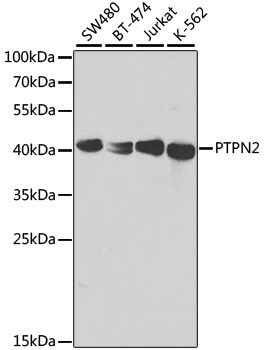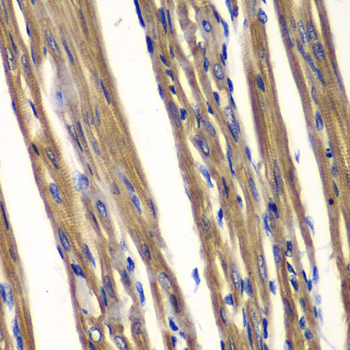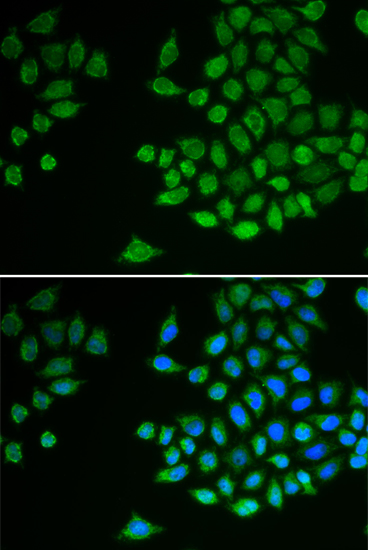Cell Biology Antibodies 7
Anti-PTPN2 Antibody (CAB1808)
- SKU:
- CAB1808
- Product Type:
- Antibody
- Reactivity:
- Human
- Reactivity:
- Mouse
- Reactivity:
- Rat
- Host Species:
- Rabbit
- Isotype:
- IgG
- Research Area:
- Cell Biology
Description
| Antibody Name: | Anti-PTPN2 Antibody |
| Antibody SKU: | CAB1808 |
| Antibody Size: | 20uL, 50uL, 100uL |
| Application: | WB IHC IF |
| Reactivity: | Human, Mouse, Rat |
| Host Species: | Rabbit |
| Immunogen: | Recombinant fusion protein containing a sequence corresponding to amino acids 1-353 of human PTPN2 (NP_536348.1). |
| Application: | WB IHC IF |
| Recommended Dilution: | WB 1:500 - 1:2000 IHC 1:50 - 1:200 IF 1:50 - 1:200 |
| Reactivity: | Human, Mouse, Rat |
| Positive Samples: | SW480, BT-474, Jurkat, K-562 |
| Immunogen: | Recombinant fusion protein containing a sequence corresponding to amino acids 1-353 of human PTPN2 (NP_536348.1). |
| Purification Method: | Affinity purification |
| Storage Buffer: | Store at -20'C. Avoid freeze / thaw cycles. Buffer: PBS with 0.02% sodium azide, 50% glycerol, pH7.3. |
| Isotype: | IgG |
| Sequence: | MPTT IERE FEEL DTQR RWQP LYLE IRNE SHDY PHRV AKFP ENRN RNRY RDVS PYDH SRVK LQNA ENDY INAS LVDI EEAQ RSYI LTQG PLPN TCCH FWLM VWQQ KTKA VVML NRIV EKES VKCA QYWP TDDQ EMLF KETG FSVK LLSE DVKS YYTV HLLQ LENI NSGE TRTI SHFH YTTW PDFG VPES PASF LNFL FKVR ESGS LNPD HGPA VIHC SAGI GRSG TFSL VDTC LVLM EKGD DINI KQVL LNMR KYRM GLIQ TPDQ LRFS YMAI IEGA KCIK GDSS IQKR WKEL SKED LSPA FDHS PNKI MTEK YNGN RIGL EEEK LTGD RCTG LSSK MQDT MEEN SERP RLTD T |
| Gene ID: | 5771 |
| Uniprot: | P17706 |
| Cellular Location: | Cell membrane, Cytoplasm, Endoplasmic reticulum, Endoplasmic reticulum-Golgi intermediate compartment, Nucleus |
| Calculated MW: | 40kDa/45kDa/48kDa |
| Observed MW: | 45kDa |
| Synonyms: | PTPN2, PTN2, PTPT, TC-PTP, TCELLPTP, TCPTP |
| Background: | The protein encoded by this gene is a member of the protein tyrosine phosphatase (PTP) family. Members of the PTP family share a highly conserved catalytic motif, which is essential for the catalytic activity. PTPs are known to be signaling molecules that regulate a variety of cellular processes including cell growth, differentiation, mitotic cycle, and oncogenic transformation. Epidermal growth factor receptor and the adaptor protein Shc were reported to be substrates of this PTP, which suggested the roles in growth factor mediated cell signaling. Multiple alternatively spliced transcript variants encoding different isoforms have been found. Two highly related but distinctly processed pseudogenes that localize to chromosomes 1 and 13, respectively, have been reported. |
| UniProt Protein Function: | PTPN2: a type 2 non-receptor phospho-tyrosine-protein phosphatase (PTP). Two alternatively spliced isoforms are differenyially expressed. Isoform A is a major PTP expressed in human tissues, while isoform B is expressed mainly in T-cells and in placenta. |
| UniProt Protein Details: | Protein type:Protein phosphatase, tyrosine (non-receptor); EC 3.1.3.48; Motility/polarity/chemotaxis Chromosomal Location of Human Ortholog: 18p11.3-p11.2 Cellular Component: nucleoplasm; endoplasmic reticulum; ER-Golgi intermediate compartment; plasma membrane; nucleus Molecular Function:integrin binding; protein binding; syntaxin binding; protein tyrosine phosphatase activity; receptor tyrosine kinase binding; protein kinase binding Biological Process: negative regulation of epidermal growth factor receptor signaling pathway; negative regulation of tyrosine phosphorylation of Stat1 protein; cytokine and chemokine mediated signaling pathway; negative regulation of insulin receptor signaling pathway; negative regulation of T cell receptor signaling pathway; negative regulation of tyrosine phosphorylation of Stat5 protein; negative regulation of chemotaxis; glucose homeostasis; negative regulation of cell proliferation; positive regulation of gluconeogenesis; negative regulation of macrophage differentiation; negative regulation of inflammatory response; B cell differentiation; negative regulation of tyrosine phosphorylation of Stat3 protein; insulin receptor signaling pathway; negative regulation of tyrosine phosphorylation of Stat6 protein; erythrocyte differentiation; T cell differentiation |
| NCBI Summary: | The protein encoded by this gene is a member of the protein tyrosine phosphatase (PTP) family. Members of the PTP family share a highly conserved catalytic motif, which is essential for the catalytic activity. PTPs are known to be signaling molecules that regulate a variety of cellular processes including cell growth, differentiation, mitotic cycle, and oncogenic transformation. Epidermal growth factor receptor and the adaptor protein Shc were reported to be substrates of this PTP, which suggested the roles in growth factor mediated cell signaling. Multiple alternatively spliced transcript variants encoding different isoforms have been found. Two highly related but distinctly processed pseudogenes that localize to chromosomes 1 and 13, respectively, have been reported. [provided by RefSeq, May 2011] |
| UniProt Code: | P17706 |
| NCBI GenInfo Identifier: | 229462762 |
| NCBI Gene ID: | 5771 |
| NCBI Accession: | P17706.2 |
| UniProt Related Accession: | P17706 |
| Molecular Weight: | |
| NCBI Full Name: | Tyrosine-protein phosphatase non-receptor type 2 |
| NCBI Synonym Full Names: | protein tyrosine phosphatase non-receptor type 2 |
| NCBI Official Symbol: | PTPN2 |
| NCBI Official Synonym Symbols: | PTN2; PTPT; TCPTP; TC-PTP; TCELLPTP |
| NCBI Protein Information: | tyrosine-protein phosphatase non-receptor type 2 |
| UniProt Protein Name: | Tyrosine-protein phosphatase non-receptor type 2 |
| UniProt Synonym Protein Names: | T-cell protein-tyrosine phosphatase; TCPTP |
| UniProt Gene Name: | PTPN2 |
| UniProt Entry Name: | PTN2_HUMAN |







![Anti-KLF4 Antibody (CAB18088)[KO Validated] Anti-KLF4 Antibody (CAB18088)[KO Validated]](https://cdn11.bigcommerce.com/s-rd6ounxcu2/images/stencil/590x590/products/55227/59970/anti-klf4-antibody-cab18088ko-validated__69592__97112.1706529209.jpg?c=1)
![Anti-FADD Antibody (CAB18082)[KO Validated] Anti-FADD Antibody (CAB18082)[KO Validated]](https://cdn11.bigcommerce.com/s-rd6ounxcu2/images/stencil/590x590/products/55223/59966/anti-fadd-antibody-cab18082ko-validated__13994__49507.1706529208.jpg?c=1)
![Anti-CDK5 Antibody (CAB18080)[KO Validated] Anti-CDK5 Antibody (CAB18080)[KO Validated]](https://cdn11.bigcommerce.com/s-rd6ounxcu2/images/stencil/590x590/products/55221/59964/anti-cdk5-antibody-cab18080ko-validated__91899__22815.1706529207.jpg?c=1)